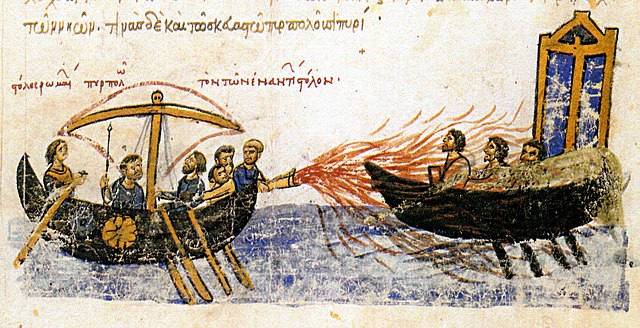Donald Trump is doing God. Today’s America is quite like 7th century Byzantium

Image from an illuminated manuscript showing the Byzantines using fire against the Arabs
On October 7, President Donald Trump said his coronavirus infection was a “blessing from God”, presumably because it enableth him to bring the world news of an unproven antibody cocktail being developed by the drug maker Regeneron. Mr Trump has already released his videotaped musings on Covid-19 therapeutic treatments, describing them as akin to “miracles coming down from God”.
Mr Trump’s pronouncements may have more to do with mammon than God (who knows if he’s invested in Regeneron in some way!) but the concept of divine intervention on behalf of a country and its people has a long pedigree.
Politico’s founding editor John Harris recently examined it in the American context. He traced the idea of a higher power at work through successive presidential pronouncements. Ronald Reagan used the sunny phrase “anointed land” to describe the United States. Abraham Lincoln had a more severe interpretation of divine intercession.
In his second inaugural address in 1865, Lincoln suggested that the war that was just ending may have been God’s punishment for slavery. “Every drop of blood drawn with the lash shall be paid by another drawn with the sword,” he said.
Mr Trump’s invoking of what philosophers call the First Cause (The One, the Creator) put me in mind of another parallel, a much older one: Seventh century Christian Byzantium, faced with the rise of the Arab Muslim caliphate next door.
Somewhat like American exceptionalism, the Roman empire regarded itself as ‘God-guarded’ and as the ‘sole legitimate empire sanctioned by divine decree’. Accordingly, when the eastern Roman empire faced multiple perils in the Middle Ages, it sought anguished answers from God.
The challenges for the Byzantines in the seventh century included the Persian wars and the Slavonic, Bulgar and Avar invasions.
But it was the Arabs who harried the Byzantines most of all.
By 634 AD, two years after the death of Muhammad, the prophet of Islam, the Arabs had taken Damascus from the Byzantines. The decisive 636 Battle of Yarmouk ended Byzantine rule in all of Syria. The next year, the Arabs captured Jerusalem and Gaza and within the next decade, the Byzantine empire had lost Egypt, its richest province.
By 650, the Byzantine empire had halved in size, lost its major agricultural base, and had dwindling financial and military reserves. It is significant that after 654, the Byzantines made no further attempt to re-take Egypt.
The demoralization that followed these developments was accentuated by what the Byzantines believed to be the heresy of the instigators of these problems, Islam.
This meant that texts from seventh century Byzantium continually portrayed the Arab invasions – and military and territorial gains – as God’s punishment for the sins of the Chosen People.
Like Mr Trump, the Byzantines were doing God.
Like Mr Trump, they were using the metaphor of divine intercession to contextualise, comfort and caution.
Tomorrow, we’ll take a look at the effectiveness of these nostrums.

